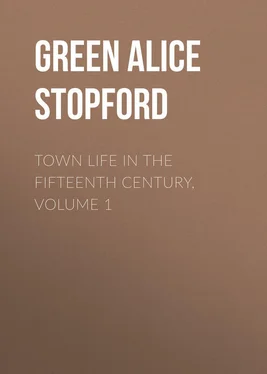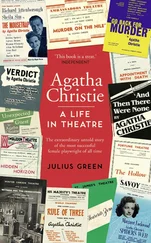Alice Green - Town Life in the Fifteenth Century, Volume 1
Здесь есть возможность читать онлайн «Alice Green - Town Life in the Fifteenth Century, Volume 1» — ознакомительный отрывок электронной книги совершенно бесплатно, а после прочтения отрывка купить полную версию. В некоторых случаях можно слушать аудио, скачать через торрент в формате fb2 и присутствует краткое содержание. Жанр: literature_19, foreign_antique, foreign_prose, Историческая проза, на английском языке. Описание произведения, (предисловие) а так же отзывы посетителей доступны на портале библиотеки ЛибКат.
- Название:Town Life in the Fifteenth Century, Volume 1
- Автор:
- Жанр:
- Год:неизвестен
- ISBN:нет данных
- Рейтинг книги:3 / 5. Голосов: 1
-
Избранное:Добавить в избранное
- Отзывы:
-
Ваша оценка:
- 60
- 1
- 2
- 3
- 4
- 5
Town Life in the Fifteenth Century, Volume 1: краткое содержание, описание и аннотация
Предлагаем к чтению аннотацию, описание, краткое содержание или предисловие (зависит от того, что написал сам автор книги «Town Life in the Fifteenth Century, Volume 1»). Если вы не нашли необходимую информацию о книге — напишите в комментариях, мы постараемся отыскать её.
Town Life in the Fifteenth Century, Volume 1 — читать онлайн ознакомительный отрывок
Ниже представлен текст книги, разбитый по страницам. Система сохранения места последней прочитанной страницы, позволяет с удобством читать онлайн бесплатно книгу «Town Life in the Fifteenth Century, Volume 1», без необходимости каждый раз заново искать на чём Вы остановились. Поставьте закладку, и сможете в любой момент перейти на страницу, на которой закончили чтение.
Интервал:
Закладка:
Even in a democratic age it is not easy at first sight to recognise where the interest lies of an epoch destitute of all that has made other times illustrious, and whose significance seems to shrink in comparison with the struggles and victories of the ages that preceded, and the splendid achievements of the age that followed it; and historians finding themselves face to face with so dreary a century may have been tempted to give it a character of its own for grossness, for cruelty, for any distinction whatever which will at least take it out of the range of the absolutely commonplace. But the distinguishing mark of the fifteenth century lies neither in its crime nor in its vulgarity. We must judge this period in fact as a time of transition in many ways extraordinarily like our own. In the centuries between the Great Plague and the Reformation, just as in the nineteenth century, the real significance of our history lies in the advent of a new class to wealth and power, as the result of a great industrial revolution. The breaking up of an old aristocratic order, and the creation of a middle class to be brought into politics and even into “society,” the enormous increase of material wealth, the new relation of the various ranks to one another, and the failure under altered circumstances of traditional rules of conduct, the varied careers suddenly opened to talent or ambition, the reproach for the first time attached to incompetence and poverty, the vulgarization of literature and morality which followed on their adaptation to a class as yet untrained to criticism or comparison, the extension of a habit of religion closely related to a plain morality – all these things recall to us many of the experiences of our own days, and may make us more tolerant of the unpicturesque and Philistine element whether then or now. If the chief centre of interest had once lain in the offices of the royal palace it might now be seen rather in the new Town Hall which was being built in almost every borough in England, or in the office where the mayor’s clerk was busied in making his copies of Magna Charta or extracts of Domesday, or in translating from the old French the customs and ordinances of the town, or in hunting up the rolls of the itinerant judges; or over the country-side where estates were being sold and bought with the development of a provincial instead of a national nobility and the rise of new men to possess the old acres, and where the quickening of the struggle for life was reflected in the stormy conflicts and significant concessions of the manor courts. The new middle class of shopkeepers and farmers had indeed no chroniclers and no flatterers, for it was long before men could realise how rapidly and completely the weight of influence was being transferred from the old governing class to the mass of the governed, and chroniclers still went on mechanically retailing events now comparatively trivial and unimportant. It was not till the next century that they turned from spinning out these worthless annals to a discussion of matters really important which had by that time forced themselves on the dullest apprehension.
The whole interest of the fifteenth century thus lies in the life of very common folk – of artisans and tradesmen in the towns, and in country parts of the farmers, the tenants of the new grazing lands, the stewards and bailiffs and armies of dependents on the great estates, who did all the work at home while the lord was away at the wars or at the halls of Westminster. If the century produced no great administrator or statesman, it did create a whole class of men throughout the country trained in practical affairs, doing an admirable work of local government, active, enterprising, resolute, public-spirited, disciplined in the best of all schools for political service. If there was no great writer, the new world of the middle class was patiently teaching itself, founding its schools, learning its primary rules of etiquette and its simple maxims of morals, reading its manuals of agriculture or law or history, practising its Latin rhymes, and building up in its own fashion from new beginnings a learning which the aristocratic class had been too proud, too indifferent, or too remote to hand on to it. 43 43 See vol. ii. ch. i.
If no religious revival shook the country, the new society was solving in its own way the problem of helping the sick and poor; 44 44 In Lydd corn was given to the poor at Christmas and Easter, and gifts to lepers; payments made from 1480-1485 for Goderynge’s daughter, “poor maid,” “hosen, shoes, her keep, kertyl-cloth and for making thereof;” also in 1490, “paid to the poor man keeping the poor child 12 pence.” After a long list of expenses for a thief and making stocks for him and a halter, “paid for one pair of shoes to his daughter 3 d. ,” and “given to the quest of women 4 d. ”; summoned perhaps in reference to the daughter. (Hist. MSS. Com. v. 527, 526.) In Rye sums were paid to the poor on opening the box of maltotes. (Ibid. 494.) For Southampton, Hist. MSS. Com. xi. 3, 112; the steward’s book in 1441 contains a list of alms, £4 2 s. 1 d. , given away every week to poor men and women. (Davies, 294.) According to the usual calculation at this time in almshouses of a penny a day for living, this sum would mean that the corporation paid weekly for the mere subsistence of 140 persons. For Bristol, Ricart’s Kalendar, 72-80, 82, &c. For Chester, Hist. MSS. Com. viii. 371. For Romney, Hist. MSS. Com. v. 535-6. The Mayor of Sandwich had to manage the hospitals of S. Bartholomew and S. John, to appoint their officers, to audit their accounts, and administer their estates made up of innumerable parcels of land and houses left by pious people. (Boys, 17-21, 526.) The municipal council of Exeter appointed every year a Warden of the Poor to look after their many charitable foundations. It had charge of Magdalen Hospital, of the Ten Cells Hospital for Poor, founded in 1406 by Simon Grendon, Mayor; the Combrew Almshouse, founded by Sir William Bonville, 1408; and an almshouse founded by John Palmer. (Freeman’s Exeter, 175-6.) There was a municipal almshouse in Hereford supported by way of payment to the corporation from ecclesiastical tenants for a share in the city’s privileges. (Arch. Ass. Journ. xxvii. 481.) In the fifteenth century bequests by burgesses for these purposes were very frequent and were usually left to the management of the corporation. In all large towns the mayor and aldermen presided over the court of orphans. (Davies’s Southampton, 239.) The indications of poor relief by the towns must modify Mr. Ashley’s conclusion (Economic History, I. part ii. 338) that “no attempt was made by the State as a whole, or by any secular public authority , to relieve distress. The work was left entirely to the Church, and to the action of religious motives upon the minds of individuals.” It seems difficult to follow in this connexion his distinction drawn between the craft associations which had or had not grown out of religious fraternities (p. 325).
it was earnest in religious observance, it was framing its English litanies and devising its own plans for teaching the people an intelligent devotion. 45 45 Besides the customary Latin prayers a Norfolk guild used English prayers for Church and State, harvest and travellers, like our Litany. (English Guilds, 111-114.) The play of the Lord’s Prayer was performed by a York guild. “They are bound to find one candle-bearer, with seven lights, in token of the seven supplications in the Lord’s Prayer.” “Also they are bound to make, and as often as need be to renew, a table showing the whole meaning and use of the Lord’s Prayer, and to keep this hanging against a pillar in the said cathedral church near to the aforesaid candle-bearer.” (Ibid. 137-9.) See also Hibbert’s Shrewsbury Guilds, 62. For Pecok as “the first author of the Middle Ages who propounded reason as a judge of faith,” and one who “might be claimed as at once the forerunner of the Erastian theory of the church, and of the Rationalist interpretation of its theology”; and for the place now given to general councils see Rogers’s Agriculture and Prices, iv. 11-13. For the first signs that the revenues of monastic houses were to be devoted to other purposes. (Ibid. 101.)
The burghers began to perform in the national economy the work which in earlier centuries had been performed by the great monastic societies. The extension of trade and manufacture had fallen into their hands; they were busied in the gathering together and storing up of the national wealth. 46 46 Agriculture remained stationary during the fifteenth and sixteenth centuries. It was in fact but little changed from the time when Walter of Henley published his treatise until the time when Fitz Herbert wrote his work about 1523 embodying most of the rules which Walter had given before him. The real progress lay not in the country but in the town.
They gave to labour a new dignity in social life and a new place in the national councils. From the towns came a perpetual protest against war and disorder; throughout the troubles of the fifteenth century, civil war, court intrigues, the tyranny of usurpers and the plots of the vanquished, local raids of private revenge or of land hunger, their influence was always thrown on the side of peace and quietness. Art found in them patrons; illuminators and painters, architects and bell-founders, the makers of delicate shrines and images, 47 47 Nott. Records, ii. 143, 145, 167, 179, 191; iii. 21, 29.
engravers of seals, goldsmiths and workers in brass, whether of English birth or brought from foreign parts, prospered within their gates; while their harpers and minstrels doubtless had a part in the musical developement of the country at a time when English artists set the fashion of the best music as far as the court of Burgundy. 48 48 Clément, Jacques Cœur, 196-7. Nicholas Sturgeon was ordered by the Privy Council in 1442 “to go and choose six singers of England such as the messenger that is come from the Emperor will desire for to go to the Emperor.” Proceedings and Ordinances of Privy Council, ed. Sir Harris Nicholas, 1834, v. 218.
They laid in fact the foundations of a new English society. The men of the New Learning, the men of the Reformation, the men who revealed the New World, were men who had been formed under the influences of the fifteenth century.
Интервал:
Закладка:
Похожие книги на «Town Life in the Fifteenth Century, Volume 1»
Представляем Вашему вниманию похожие книги на «Town Life in the Fifteenth Century, Volume 1» списком для выбора. Мы отобрали схожую по названию и смыслу литературу в надежде предоставить читателям больше вариантов отыскать новые, интересные, ещё непрочитанные произведения.
Обсуждение, отзывы о книге «Town Life in the Fifteenth Century, Volume 1» и просто собственные мнения читателей. Оставьте ваши комментарии, напишите, что Вы думаете о произведении, его смысле или главных героях. Укажите что конкретно понравилось, а что нет, и почему Вы так считаете.












